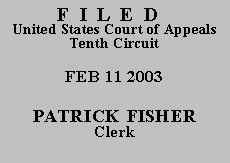

| UNITED STATES OF AMERICA,
v.
SHAWN E. STEWART |
98-CR-40097-SAC |
In order for this court to grant a certificate of appealability ("COA"), Mr. Stewart must make a "substantial showing of the denial of a constitutional right." 28 U.S.C. § 2253(c)(2). Where the district court has denied a claim on the merits, he must demonstrate "that reasonable jurists could debate whether (or, for that matter, agree that) the petition should have been resolved in a different manner or that the issues presented were adequate to deserve encouragement to proceed further." Slack v. McDaniel, 529 U.S. 473, 484 (2000) (quotations omitted). Where the district court has denied a claim on procedural grounds, he must demonstrate "that jurists of reason would find it debatable whether the petition states a valid claim of the denial of a constitutional right and that jurists of reason would find it debatable whether the district court was correct in its procedural ruling." Id.
We have adhered to the view that only a potential effect on interstate commerce is necessary to satisfy the interstate commerce element of a § 1951(a) offense. United States v. Toles, 297 F.3d 959, 969 (10th Cir. 2002). With respect to the jurisdictional element, Mr. Stewart pleaded guilty unconditionally and as a matter of law he admitted all material facts charged in the indictment, see United States v. Broce, 488 U.S. 563, 569 (1989), including all factual predicates to jurisdiction, see United States v. Brown, 164 F.3d 518, 521-22 (10th Cir. 1998). For substantially the reasons given by the district court, R. Doc. 78, we DENY a COA and DISMISS the appeal. We GRANT the motion to file Appendix I under seal.
Entered for the Court
Paul J. Kelly, Jr.
Circuit Judge
*. This order and judgment is not binding precedent, except under the doctrines of law of the case, res judicata, and collateral estoppel. This court generally disfavors the citation of orders and judgments; nevertheless, an order and judgment may be cited under the terms and conditions of 10th Cir. R. 36.3.
2. After examining the briefs and the appellate record, this three-judge panel has determined unanimously that oral argument would not be of material assistance in the determination of this appeal. See Fed. R. App. P. 34(a); 10th Cir. R. 34.1(G). The case is therefore ordered submitted without oral argument.